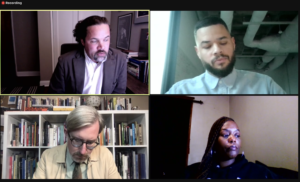
Clockwise, from upper left: Geoff Ward, Jordan Weber, Inez Bordeaux, and Michael Allen
The question in yesterday’s Zoom event hosted by the Pulitzer Arts Foundation, in St. Louis, was how artist residencies, art institutions, universities, and activist organizations might work together for social justice. How do you measure collaborative success in such projects?
One answer: policy change.
The host, Geoff Ward, is Professor of African and African-American Studies at Washington University and “a founding member of the Reparative Justice Coalition of St. Louis, a community-based organization working to commemorate histories of racist violence, and to address their legacies in our region.”
The three panelists—activist Inez Bordeaux, artist Jordan Weber, and scholar Michael Allen—took turns suggesting other outcomes for the mix of public art projects and advocacy. These included better “visions” that show “what can be”; “oppositional consciousness” to help people “unlearn indifference” to their being and welfare; and the potential for solidarity.
Ms. Bordeaux, who has been in the trenches on the Close the Workhouse campaign, spoke at length about nearing a policy solution to closing the jail officially known as the Medium Security Institute in St. Louis. The Workhouse is known for its inhumane conditions and high cash bail system that keeps people incarcerated as they wait for trial, instead of going home, as might normally happen in many cases.
But, “I’ll be honest,” she said, “I had not thought about the arts helping with social justice until I met Jordan.” Much of the hard, grassroots work of the campaign has been done without arts collaboration, but that is changing.
Jordan Weber, a multidisciplinary artist based in Des Moines, is an artist-in-residence with the Pulitzer Arts Foundation; Washington University’s Center for the Study of Race, Ethnicity, and Equity; and its Sam Fox School of Design & Visual Arts.
Bordeaux praised the calm and contentment of Weber’s Poetry vs Rhetoric (Stoop) installation, made in collaboration with the Close the Workhouse Campaign/Arch City Defenders.
“The stoop acts as a library with bookshelves hosting free handbooks on what to do when encountering police and who to call when being unlawfully arrested,” a website explains. The Pulitzer Foundation says Weber “is best known for a series of urban land remediation projects on vacant lots and his deconstructed police vehicles, which have been turned into community gardens.”
All participants in the seminar discussed the landscape of St. Louis in terms of environmental racism, which is not just about industrial pollution or pushing people out of neighborhoods because they have little agency; it is also about the narratives created by the society at large: about who belongs on the landscape, who has existed, and what roles they have played in the city.
Michael Allen, who “sees history as space as well as time,” works on how the built environment encodes political relationships and economic histories, and how some aspects of culture are chosen for commemoration while others are ignored or buried. (Think about which buildings get preserved and designated historic landmarks, for example.) Allen spoke about the layers of history and use of what is now known as Spring Church, a fire-destroyed Black church in St. Louis, stabilized by the Pulitzer Arts Foundation for art installations and public use.
Encouraged to offer successful models of collaborative work in the arts and advocacy, participants also mentioned:
- THA MUTHASHIP Mobile Wellness Studio & Farm, which would serve under-resourced neighborhoods in St. Louis
- Israeli artist Dana Levy’s work (an installation is now at the St. Louis Art Museum)
- America’s Mythic Time, an exhibition from The Luminary and ArchCity Defenders
- Park-Like, a sustainable city green space in St. Louis, from the Pulitzer and Studio Land Arts
- And Frogtown Farm, “a certified-organic urban demonstration farm that practices a permaculture approach,” in St. Paul, Minnesota
